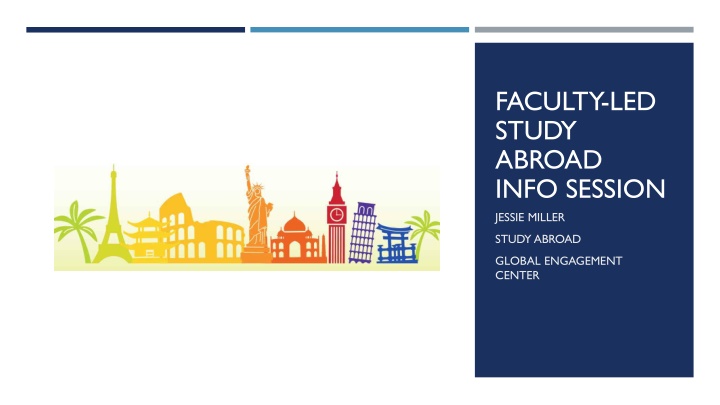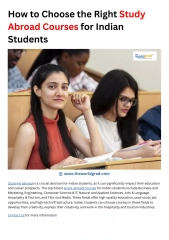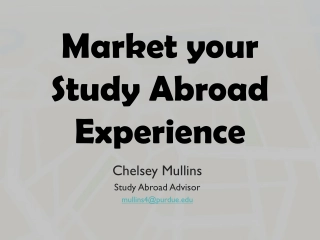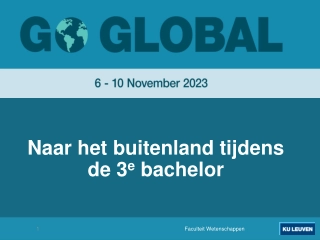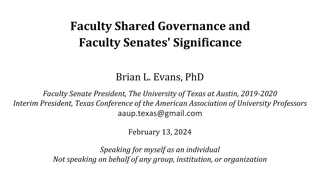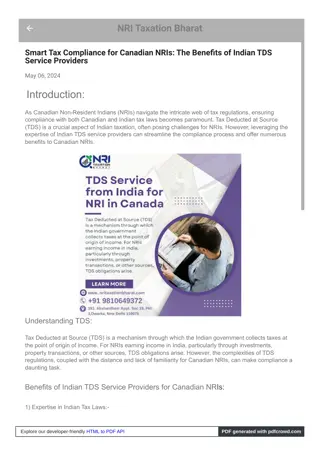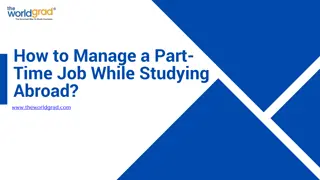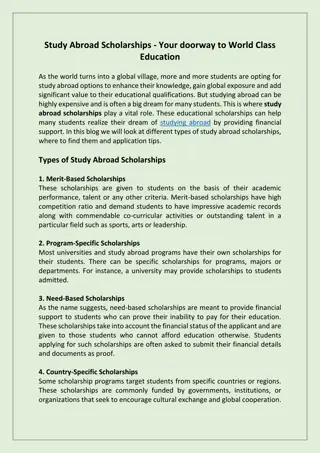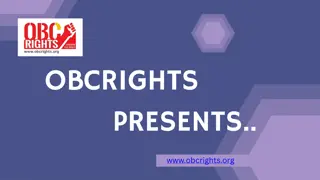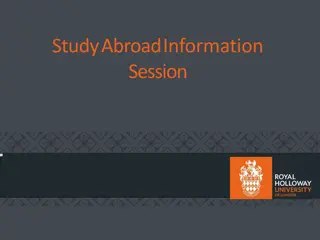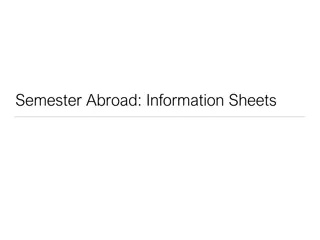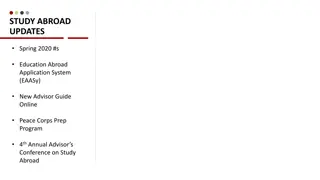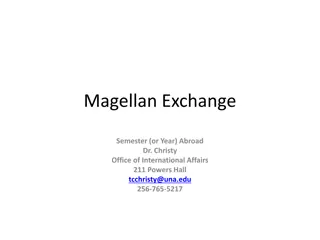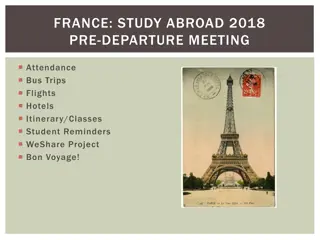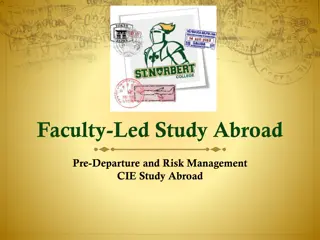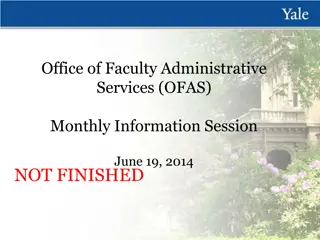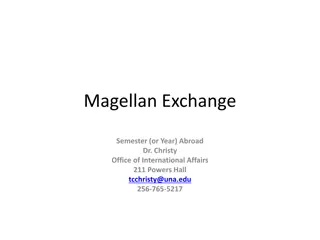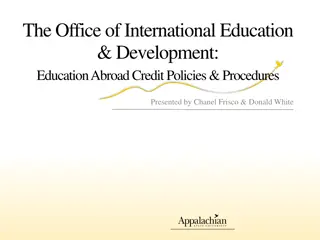Faculty-Led Study Abroad Information Session at SHSU Global Engagement Center
SHSU offers faculty-led study abroad courses with specific requirements and responsibilities for faculty members. The programs provide unique teaching experiences, access to academic resources abroad, and opportunities for students to study in various countries. Faculty members play a key role in creating, managing, and leading these programs, supported by the Study Abroad Office to ensure a successful experience for students. Various locations are available for study abroad, with considerations for safety and partnerships with universities or vendors.
Download Presentation

Please find below an Image/Link to download the presentation.
The content on the website is provided AS IS for your information and personal use only. It may not be sold, licensed, or shared on other websites without obtaining consent from the author.If you encounter any issues during the download, it is possible that the publisher has removed the file from their server.
You are allowed to download the files provided on this website for personal or commercial use, subject to the condition that they are used lawfully. All files are the property of their respective owners.
The content on the website is provided AS IS for your information and personal use only. It may not be sold, licensed, or shared on other websites without obtaining consent from the author.
E N D
Presentation Transcript
FACULTY-LED STUDY ABROAD INFO SESSION JESSIE MILLER STUDY ABROAD GLOBAL ENGAGEMENT CENTER
SHSU faculty members teach an SHSU course abroad or away The course must be taught abroad for more than 50% to be considered a study abroad course Courses offered abroad must adhere to the same minimum requirement for number of contact hours and academic integrity as on-campus courses WHAT IS FACULTY-LED STUDY ABROAD? The location where the course is taught must be relevant to coursework and enriching to the students experience and understanding of the content Courses can be taught at the undergraduate or graduate level: Undergrad courses must have a minimum of 10 students Graduate courses must have a minimum of 5 students
Faculty members are responsible for: Creating their program proposal, with guidance from GEC and Academic Planning and Assessment Creating and managing their budget Working with third-party vendors or partner universities to support their program WHAT IS FACULTY-LED STUDY ARBOAD Recruiting students Leading the program Completing required post-program paperwork The role of the Study Abroad Office is to assist you throughout this process.
Unique teaching experience, different kind of professor/student experience. Access to academic resources abroad for personal research. WHY LEAD A PROGRAM ABROAD? Most common study abroad model for students. Going with a professor they know and trust, and with fellow SHSU students, provides a sense of comfort and familiarity, especially for first-time travelers. Internationalizing the campus and your department. Recruit students by offering specialized international opportunities within their major
WHERE CAN I GO? Restrictions: Locations on the U.S. State Dept. Travel Advisories List level 3-4 Most of these locations are not ones you would typically consider anyway (Syria, North Korea, etc.), but be aware that this list also includes the following: Turkey, Honduras, Venezuela, some regions of the Philippines, Mexico, and Colombia. Locations not covered by SHSU On Call travel insurance (these lists generally overlap) Current SHSU faculty-led program locations: Kenya Italy Costa Rica Japan England Mexico Germany Poland Ireland United Arab Emirates Have a location in mind, but no partner university or third-party vendor contacts? Talk to the Study Abroad Office- We have lots of contacts!
OUT-OF-STATE PROGRAMS Can I lead a study abroad program in Arizona? Yes! That s called Study Away! New York? Alaska? Hawaii? Puerto Rico? All considered Study Away The GEC governs Study Away programs as well Study Away programs are subject to the same proposal review, policies, and regulations as Study Abroad programs Perks of Study Away programs: Students don t need a passport May appeal to DACA students and others with travel restrictions May not require students to fly May appeal to students with little to no overseas/travel experience Drawbacks of Study Away programs: Students don t gain international experience Know your student population!
You can teach any course that you would regularly teach on-campus at SHSU. The course must: Have a direct connection to the location it is being taught in Have a minimum of 10 students enrolled (or 5 students for graduate courses) WHAT CAN I TEACH? The course(s) offered could be Topical Offering 1-2 courses geared toward specific majors Typically limits student recruitment to within your department, but may allow you to offer upper level/cross-listed courses Interdisciplinary Courses that could fill general electives across majors Allows you to recruit students, and work with faculty from multiple departments Discuss with your Chair and Dean what will work best for your department.
The program length should match up with the credits being offered. Max 15 contact hours/1 contact hour can be awarded per week abroad (in other words, a 3-week program could offer a 3-credit course). WHAT S THE PROGRAM LENGTH? Most SHSU faculty-led programs are 2-4 weeks in length during the summer, but it s also possible to offer programs during Winter and Spring Break. If all contact hours cannot be earned abroad, instruction can be a combination of on-campus instruction and out-of- country instruction.
QUESTIONS TO ASK WHILE DEVELOPING A PROPOSAL Does the program support the overall mission of the institution, college, and department? Does this program fit a needed academic or geographic niche not currently available to SHSU students? What is the minimum number of students you need to recruit? Is this number sustainable year after year? Will this program fit well with SHSU academic calendar and students degree plans? Is this program affordable to students? Have you visited the location, and can you provide information at the orientation of the program to prepare students for their study abroad experience? Can you also attest that this site has the necessary resources and support for participants? What connection can I draw on from research/academic colleagues? Who might be a good faculty partner (if desired)
Spring 2023: Consult with your Department Chair/Dean AND Jessie/Global Engagement Center regarding proposal questions and concerns July 2023: Put the final touches on your proposal and get the necessary proposal signatures from your Department Chair and Dean PROPOSAL TIMELINE DEVELOPMENT August 1, 2023: Proposal are due to the GEC. The GEC will take two weeks to review proposals and will reach out to you if edits/clarifications are necessary. August 14, 2023: Proposals are due in the Office of Academic Planning. Academic Planning will review proposals and inform you of necessary edits/clarifications, with the Global Engagement Center Late November 2023: Receive notification from the THECB (through GEC) about course approval The August 1st and August 14th deadlines are fixed and non-negotiable. Start your planning EARLY!
PROGRAM TIMELINE - PLANNING Mid-August-October 2023: Begin marketing proposed program to students. Mid-August-October 2023: Submit New Fund Request (new programs only) January-February 2024: Submit Travel Requisition and Class Schedule Maintenance Form November-December 2023: Submit Vendor W-9s January-March 2024: Last marketing/recruiting push- Courses with fewer than 10 students will be contacted. March-April 2024: Submit Direct Payment Form, Outgoing Wire Form, and Travel Cash Advance Request March 2024: Students must have all required paperwork submitted to the GEC.
PROGRAM TIMELINE EXECUTION 01 02 03 March-April 2024: Study Abroad Coordinator will conduct a Pre- Departure Health and Safety Orientation for students April 2024: Students will register for their classes in MySam May-July 2024: HAVE FUN ON YOUR PROGRAM!
PROGRAM TIMELINE POST PROGRAM 2 weeks after return: Submit Faculty Expense Report and Accountability Form 4 weeks after return: GEC will administer student evaluations 1 months after return: Budget Reconciliation
Jessie Miller Global Engagement Center WANT TO LEARN MORE? Farrington 116 jtm096@shsu.edu 4-3276
